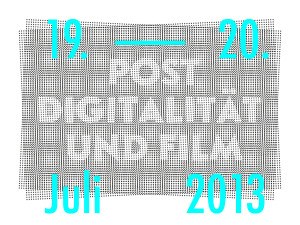Post-digitality and film
 The world is pervaded by the digital. No act, no desire, no experience that has not been shaped by digital technologies. And yet, the promises of a digital utopia have not come true. The digital has become part of our everyday lives, it is no new ontological level, cleanly separated from reality, but rather deeply intertwined with the materiality of our world.
The world is pervaded by the digital. No act, no desire, no experience that has not been shaped by digital technologies. And yet, the promises of a digital utopia have not come true. The digital has become part of our everyday lives, it is no new ontological level, cleanly separated from reality, but rather deeply intertwined with the materiality of our world.
The “post-digital” has become the central concept of those discourses in music and art that have turned away from digital utopias and reflect on the close relationship between materiality and digitality. In film or media studies, however, this concept has not yet been widely received. This is even more surprising considering the fact that technological and sociological developments of the post-digital era have changed cinema, television and other media in such a profound way that often the very definition of these media is at stake. Feature films are watched on smartphones, political advertising clips are discussed on Twitter, photo image editing imitates analog photography by elaborate filters, and private experiences are recorded and shared on YouTube.
As cultural and media praxis, the post-digital has two rather different tendencies: as affirmative post-digitality, it refers to the fact that we use digital technologies and ways of communication and got used to them as mere tools. They are the (seemingly) unproblematic and transparent equipment for the postindustrial subject, the digital native. On the other hand, we can observe a tendency to analyze the cultural, political and material significance of the digital in the arts. The artists of this more self-reflexive post-digitality make use of digital errors and “glitches” to render the medium and its means of production visible and audible. In effect, these critical positions tend to develop a feeling for fractures or power relations that are hidden behind the apparently neutral structures of the digital.
The “post” in post-digitality is thus not to be misunderstood as a counter-movement to the digital or even as a return to some pre-digital era. What is coming to an end here is the digitalization of society, the era of digital revolution, marked by the utopian fantasy that, in the end, technology would make us independent of any materiality. Digital technologies and communication are not something subversive, subcultural or futuristic any more – or at least not necessarily.
In our conference we would like to examine the concept of post-digitality and its relevance for the context of film and media studies. As the concept of the post-digital touches different areas of theoretical discourse and creative practice we also wish to encourage the exchange between academic and non-academic discourses as well as between such different disciplines as music, art and media studies. With this conference, we would like to explore the intertwining of the digital and the material in contemporary post-digital media praxis and the spaces of social action and interaction it opens.